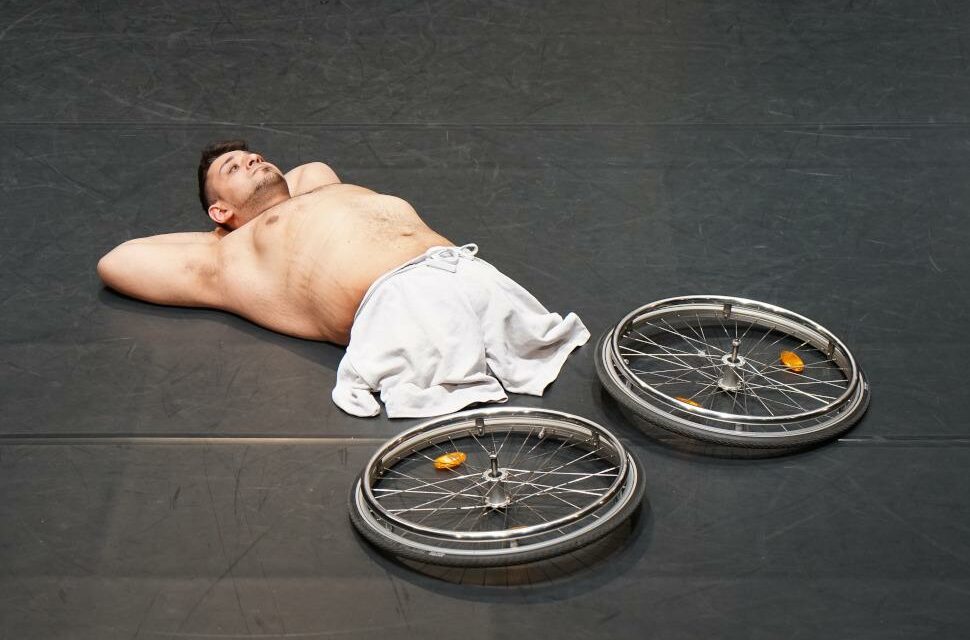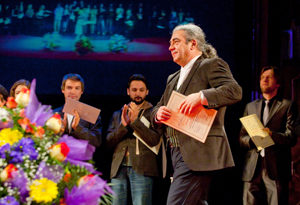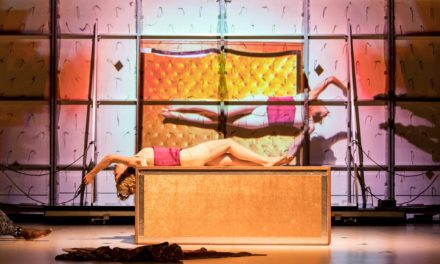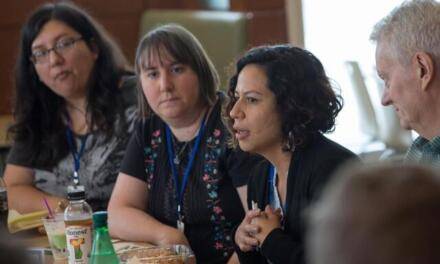Heavy rain has restricted the opportunity to take a city walk around Dresden with festival participants. Instead, many of the audience members and artists are housed in the Klaus Haus for another series of events on Monday afternoon. Day Three at the ‘Our Stage’ Festival is in full swing, despite the change in the weather.
Participants are gathering for the ‘Table Talks: Expert Projects from Salzburg’, in which three students of the Directing Master at the University Mozarteum Salzburg introduce the results of their most recent collaborative projects.
The projects are based on the theme of: RED WHITE RED and are an opportunity for young directors to open up new and challenging subjects for performance, and to begin everything from scratch. It’s a mission to try and create something new and to never do the same. According to this mission, there is a claim for the emancipation of students to stop carefully structuring their work.
Thus, three table talks ensued in which participants could find out more about each individual project. Each one reflects a powerful and interpretative look at certain urgent themes within Austria and all excitingly different from one another. Ms. Ebru Tartıcı Borchers, a Turkish director, explored the idea of the book burning, and – encompassing historical research from both 1933 and 1939 book burnings as a result of fascism and national socialism – explores the mentality of living in danger. It’s another fascinating way of looking at documentary theatre, and how this issue-based research can ultimately lead to a performance which she describes as a ‘theatre of experts.’ I’m unsure exactly what this term means, other than leading to some specific subject that is lead by a dramaturgical mind attuned to the major specifics of a certain subject for performance.
Next, Ms. Verena Holztratter explores the role of the police in Austria, in her piece: Polizei. An initial starting point is a personal experience with the police, in which that negativity becomes foregrounded in an unfortunate encounter, whoever the person in question might be. This is a performance that raises questions such as: who are the police protecting? Who is protecting the police? What is certainly a key question, and one that Ms. Holtztratter seems to highlight is: am I a citizen here? Following multiple emails and recorded interviews with members of the police (some of who are, understandably, reluctant to share important aspects of inside information), a performance was created based on the motivations of what it means to become a member of the police; power and politics, as well as their portrayal in the media. Ultimately, we as an audience are made to think whether we consider the police as human beings and what are our own perceptions of them are.
Lastly, Ms. Hanna Bader presents her performance piece Kraiβ / Saal (Delivery Room), a project looking at the theme of birth. Despite this being a work-in-progress, there is potential to the potency of this production. The trauma of birth is explored through the personal experiences shared by many women. As an initial source, the portrayal of birth in the media is one that is comical, and ultimately, a pleasant experience. This performance aims to reverse that, and show that many women experience a kind of trauma in medical environments that are understaffed and overworked, and therefore, doesn’t focus on the health and wellbeing of the women in labor at hand. The word ‘violence’ rears its recurring head during this talk: an interesting choice of word for the subject, but what does spark curiosity is the idea of power structures within hospitals, and how the own personal experience of the individual leads the way to the more macro themes in how our governmental institutes are catered for the individual.
Ultimately, inviting the next generation of theatre-makers in Europe to events like these solidify the promise of a progressive and collaborative art form in the future. It’s important to showcase the work of young artists like this in an environment where they can network and learn from one another. Having the courage to present the first baby steps of new work to a wider and cultural audience is no easy task, and I take my hat off to each and every one of them.
~
At the Hallertau Centre for Performing Arts, Austrian choreographer Doris Uhlich presents her innovative new production of Every Body Electric, in a co-production with Tanzquartier Wien, Schauspiel Leipzig, and Theaterverein. Uhlich’s work has placed people with and without the interest of contemporary dance into her framework since 2006. This performance marks an additional step in her explorative concept of ‘Energetic Icons’, placing together professional and non-professional performers with physical disabilities, and encompassing: ‘the energetic dancing of people whose bodies do not conform to the normative restrictions’, and asking, ‘who owns the stage and what may be shown there?’
Dramaturgically, it is evident that the performers own that stage for the entirety of the performance. Riddled with a continuous musical rhythm through a beating soundtrack, we as an audience are given a presentation of the limitless capacity of the human body. Personally, what I see is that whilst each body has its own limitations and capabilities, that does not mean it doesn’t have the capacity to charge or ignite the viewer.
A performer steps out of his wheelchair deconstructs it by taking off the wheels and the footrests and then places them on areas of his body. It becomes an extension; a part of his own unique way of moving, and a mechanism to help the fluid and individual movement. And much of the same occurs with the other five performers. What this performance does is outweigh the social stigmas of the disabled body’s limitations by creating a continuous and rhythmical action that carries its audience along with it.
Another performer shifts and jerks on the floor without a layer of clothing. The act of this in itself is not the bold and courageous move. It’s the idea of saying to an audience: look at me for the next 70 minutes. And we do. The audience shifts themselves into a bold and courageous position, and with any hope, change their perceptions of these recurring social stigmas. More importantly, bodies that show different capabilities to that of the normal body, are creating their own fascinating shapes that are more interesting to watch. This performance highlights that it’s the difference between the individual that makes urgent and inspiring theatre-making.
It isn’t, as the title describes, that everybody is electric: it’s that every BODY is electric in its own individual way.
For more information, visit ‘Our Stage’ Festival webpage.
This post was written by the author in their personal capacity.The opinions expressed in this article are the author’s own and do not reflect the view of The Theatre Times, their staff or collaborators.
This post was written by Christopher Harris.
The views expressed here belong to the author and do not necessarily reflect our views and opinions.


















